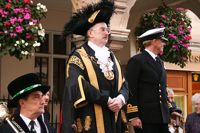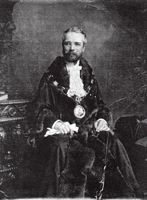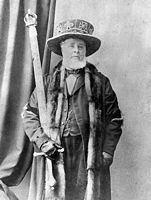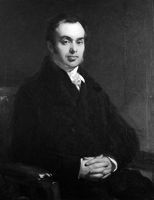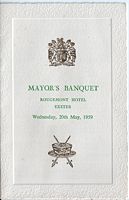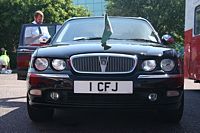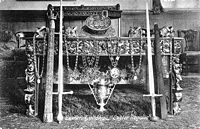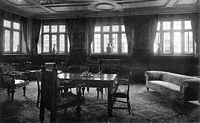
The Mayors Office
Page added 4th March 2014
The Mayor and Council of Exeter
London was the first city to appoint a Mayor in 1191, Winchester the next in 1200, and Exeter in 1200 or more likely 1205, making the city's Mayor the third longest serving in England. The Mayor, along with his portreeves, controlled the city - everything from the locking of the city gates at night, the regulation of trades such as brewing and baking, and the control of the markets, falling under his authority. In 1345, Edward III required that a chamber of 12 freemen be appointed to administer finance and other matters. In 1497, Henry VII reformed the chamber with a governing body, a form of government that would not change until 1835, and in 1509, a young Henry VIII decreed that twenty-four of the 'most sufficient and discreet citizens and inhabitants' were to form a council. When a vacancy arose in the chamber, normally due to a death, the freemen of the city would vote in a new member, from amongst their number.
Freemen
A freeman was a man who had served his apprenticeship and was free to conduct his trade in his own town; a son could inherit his father's freedom. Freemen, who were members of guilds were granted special privileges and monopolies of trade within the city. A freeman had to serve the Mayor, by defending the city and help maintain the city fabric, while in return, he could vote at the election for a new member of the chamber or the Mayor.
It
wasn't until the
19th century that an attempt to widen the franchise was made. Two
Reform Bills in 1831 were debated in Parliament, and voted down; a
third bill was passed in 1832, extending the right to vote to male
owners of land of more than £10 value and certain
leaseholders. It
was at this point that the city split into the modern Conservatives and
Whigs who later evolved into Liberals, and the council became
more
party political. In 1835 there were 586 freemen in the city out of a city
population of over 28,000. In 1867, the Second Reform Act extended the
franchise by lowering the value of land or the leasehold value of
householders, and in 1872, the first secret ballot was introduced. It
wasn't until 1918 that universal suffrage for all males over 21 and
females over 30 was introduced.
Freemen didn't
disappear, but
they naturally declined at the demise of the Guilds and with local
government reform. From 1885, a council has only been able to bestow an honoury freedom upon a
citizen, and Exeter has bestowed honoury freedom upon Admiral Lord Nelson, William Temple,
Archbishop of
Canterbury, and the Crew
of HMS
Exeter, among others. Inherited freemen, of which there are
perhaps
half a dozen, that still live in the city, can still apply to the Nicholas
Spicer Charity (Mayor in 1644) if they hit hard times.
The Chamber
Eventually the chamber comprised the Mayor, eight aldermen and fifteen common councillors. The Mayor was elected on the Monday before Michaelmas (Feast of St Michael, on the 28th September) by the freemen, from two names selected by the Chamber from their 24 members. The councillors and aldermen were elected for life, again by the freemen. The Mayor and Alderman were Justices of the Peace, and could preside at trials and pass sentence. The chamber controlled the corporation, and the workers employed by the city such as watchmen, bailiffs and scavengers.
The system did allow lowly men to rise to become Mayor, but there was no democracy for the common man, who was not involved in voting for and running the chamber.
The Municipal Corporations Act of 1835 reformed the chamber, increasing the council members to thirty-six and forcing an annual election of twelve or a third. It gave them new civic responsibilities and was the beginning of our modern local government.
Mayors of Exeter
Exeter had the oldest 'Right Worshipful' Mayoralty in England after the City of London and Winchester, giving the Exeter Mayor a head position in all parades and ceremonial occasions. For example, when the Mayors and Lord Mayors of other cities were invited to Exeter to celebrate the 400th anniversary of the granting of County status in 1937, Exeter's Mayor was at the head of the procession into the Cathedral by virtue of his seniority.
Until the 1974 reorganisation, the Mayor was an ex-officio magistrate, and when he attended the City Magistrates Court he would sit wearing his robes and chain. He would 'hear' a couple of cases and then adjourn. The City Mace Sergeant would sit with the mace, in the witness box on the right, there being two witness boxes, which was unique. The last time the City Assize was held in 1971, there were no cases to he heard so the court was convened for a photograph to be taken (see photo right).
The status of Lord Mayor was awarded as part of the Queen's Golden Jubilee celebrations in 2002, therefore as a junior appointment, the Lord Mayor walks at the rear of national parades of Mayors and Lord Mayors, whereas, previously, the Exeter Mayor was third most senior, and third in any procession. Councillor Granville Baldwin became the first Lord Mayor of Exeter on 21st April 2002 although the Letters Patent awarding the city a Lord Mayor were actually delivered as part of the Queen's visit in May of the same year. The Lord Mayor and Deputy Lord Mayor are elected from among the 40 Exeter City Councillors. The Lord Mayor is a non political post while the Deputy Lord Mayor remains politically active. They are kept busy attending more than 600 functions during the year. The Lord Mayor raises money for a chosen charity and attends many fundraising events.
Sergeants at Mace
The Sergeants at Mace that look after the Guildhall, and the six staff-bearers and night watch, policed the city before 1835. When the watch committee initiated changes after the 1835 Municipal Corporation Act, the Sergeants at Mace and staff-bearers were at the heart of the new system of policing. It proved to be ineffective, with much drunkenness, especially among the night watch, It was in 1847 that the first police force was formed in a more modern form, retaining the Sergeants at Mace until 1891. The modern Sergeant at Mace are recruited from retired forces or police personnel, and do everything from guarding the Guildhall, chauffeuring the Mayor, and attending official functions, while the senior Sergeant at Mace is also the City's sword bearer. The Mace Sergeants wear the Waits Chains on ceremonial occasions - these date back to the 15th and 16th century, and were originally worn by the city's official musicians.
│ Top of Page │
